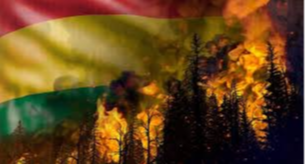
Bolivians have been fighting the fires for one hundred and twenty days, which have damaged almost 7 million hectares of forests and pastures, mainly in the eastern part of the country
By Roberto Morejon
The Bolivian government is deploying an unprecedented joint operation in the fight against forest fires, which started last June and threaten to leave indelible marks on the economy.
The mobilization of five aircraft, nearly four thousand firefighters and more than 3,900 armed forces personnel, in addition to the help of other countries, such as Venezuela, has been essential to confront the chain of fires.
Bolivians have been fighting the fires for one hundred and twenty days, which have damaged almost 7 million hectares of forests and pastures, mainly in the eastern part of the country.
With more accentuated damages in the departments of Santa Cruz and Beni, experts emphasize the environmental contamination, qualified as extremely risky.
Independently of the fact that the drought feeds the voracity of the fires, there is another cause, the malicious generation of fires, as denounced by President Luis Arce.
According to this criterion, most of the ignitions have their origin in the areas cleared for large-scale monocultures and thus contribute to speculation with the price of land.
On September 11, the government decreed an environmental pause for an undetermined period of time with the prohibition of burning and the revocation of previously granted authorizations.
The measure is understandable given that, of the countries with Amazon rainforests, only Brazil has surpassed Bolivia in area burned this year.
Given the scale of the fires, the government is taking steps to prevent further damage to the economy: Bolivia has low inflation compared with the rest of Latin America, and the authorities are trying to prevent its cheap food from spilling over the borders into neighboring countries.
But the rising price of oil, which Bolivia has to import, a drop in rice production and an acute shortage of foreign currency are exacerbating the economic situation.
Bolivia imports almost 80 per cent of its diesel, more than 50 per cent of its petrol and is suffering from the cancellation of contracts to sell gas to Argentina. In this urgent context, President Arce made a dramatic appeal to the Plurinational Legislative Assembly to release credits blocked by the maneuvers of the right wing and other opponents.
At times like these, Bolivia needs the contribution of all sectors to face the latent problems.

